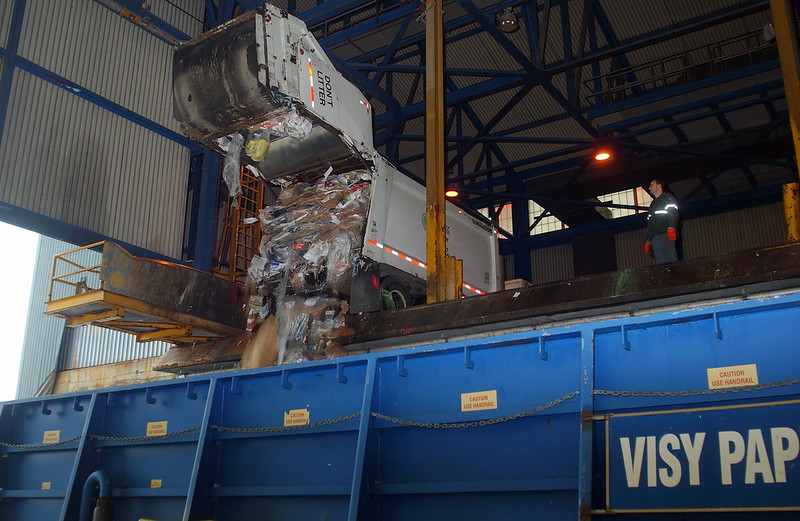
Garbage time (photo: Michael Anton/Department of Sanitation)
Unequal impacts of COVID-19 on low-income Black and brown communities have magnified the consequences of our unsustainable working and living processes and accumulated environmental injustices.
The highest rates of pandemic-related deaths are in the same communities that have long breathed more polluted air and who deal day-to-day with heightened police violence. The accelerating climate crisis will amplify both of these forms of violence as the stagnant quality of hot air concentrates local pollution and local governments are predicted to continue responding to climate stressors and survival economics with increased policing. Yet in the face of hundreds of thousands of people mobilizing in the streets following Black leadership to demand New York City’s budget divest from policing and invest in communities, the City Council and Mayor have shown their true colors.
New York City’s new fiscal year 2021 (FY21) budget fails the calls to restructure our society away from carceral systems and toward systems that nourish community safety and wellbeing.
As Black femme and Brown nonbinary organizers fighting for environmental and climate justice in our personal and professional lives, we understand the roots of the climate crisis to be the same as those that have led to COVID-19’s emergence and disproportionate impacts. White supremacy, patriarchy, and capitalism are harmful ideologies that allowed the brutal enslavement and torture of Africans and violent colonization of Indigenous communities globally. Abolition did not dissolve slavery, but transitioned anti-Blackness into the foundation of our current systems.
Today, systems of violence and oppression are rooted in these ideologies and consequently engender the highest burdens and harms to Black, Indigenous femme, transgender, queer, and disabled people. These systems continue to proliferate through racist and classist legislation and budgetary processes that are enabled by military and carceral forces.
In the wake of the pandemic, breaking climate records, and mass calls for systems that affirm the value of Black life, both of our organizations have continued to embody frontline solutions.
Since 1991, New York City Environmental Justice Alliance has worked to rectify the negative impacts of disparate siting of noxious infrastructure in Black and brown communities through research, education, and advocacy, while also working to gird against the intersecting, harmful effects of climate change.
BK ROT is New York City’s first food-waste bike collection and composting service in Bushwick, Brooklyn. Powered by local youth, BK ROT reflects the intimate ties between environmental and social injustices, and the need to center local youth leadership in advancing solutions. During the city’s closing of residential composting options, BK ROT continued to employ youth essential workers to safely collect and process food waste, which reduces local air pollution, improves our lead-burdened soils, and feeds our communities. Furthermore, BK ROT and some NYC-EJA members have joined mutual aid work, including by servicing and supporting food distribution hubs with bike-based deliveries.
The de Blasio administration has acknowledged that the city is far from achieving its waste equity and zero waste goals, but upon strong coercion by Mayor de Blasio the City Council approved a budget for FY21 that eliminates several services essential to community health, while leaving NYPD’s $6 billion budget nearly completely intact. Our communities need resources to thrive and build resilience in the face of worsening crises. It is time we stop investing in harmful systems rooted in white supremacy and invest in regenerative, life-giving systems that nourish and heal our communities and this sacred earth we live upon.
A budget that truly recognized our current crises would have defunded the NYPD and expanded a variety of social and environmental services, including restoring and expanding organics drop-off sites, mandating curbside organics collection, and promoting green jobs and youth employment opportunities that further climate resilience and model regenerative economies (see recommendations for climate and environmental justice investments in our waste system here).
As for legislative and budgetary solutions in the short-term, the proposed CORE Act in the City Council could restore and increase equity in access to organics and textile drop off sites while we continue pushing for more comprehensive organic waste collection citywide. As we await to see how the $2.86 million funding for composting in the FY21 budget is allocated, we will promote resources for composting locally where you can.
When the administration has failed communities, we have seen mutual aid groups rising up to meet the gaps. Until city government aligns its priorities with communities, we must work to create alternatives that model and advance environmental and climate justice. We are inspired by mutual aid food distribution hubs, like University Settlement and Mayday Space, community free fridges, and the rise of grassroots food scraps drop-off sites.
From the individual to the community level we must shape change, while movements put pressure on systems of governance for them to catch up. It is critical that we take decisive action towards a better future and divest from the root causes of current crises that replicate harms in our communities.
***
Ceci Pineda is Executive Director of BK ROT and Tok Michelle Oyewole, Ph.D., is Policy & Communications Organizer at the New York City Environmental Justice Alliance. On Twitter @iamceci & @_DrTok.
***
Have an op-ed idea or submission for Gotham Gazette? Email This email address is being protected from spambots. You need JavaScript enabled to view it.




